Review: THE DUCHESS OF MALFI, Almeida Theatre

![]() Following the success of Summer and Smoke at both the Almeida and the Duke of York's, director Rebecca Frecknall returns to the former venue with John Webster's The Duchess of Malfi. Taking Webster's grotesque tale of betrayal, this production sets the lives of its female characters on brutal display with a relentless atmosphere.
Following the success of Summer and Smoke at both the Almeida and the Duke of York's, director Rebecca Frecknall returns to the former venue with John Webster's The Duchess of Malfi. Taking Webster's grotesque tale of betrayal, this production sets the lives of its female characters on brutal display with a relentless atmosphere.
Things take a bloody turn when the young, recently widowed Duchess of Malfi (Lydia Wilson) takes her steward Antonio (Khalid Abdalla) for her new partner. Upon hearing of this betrayal of love, the Duchess's brothers, the Cardinal (Michael Marcus) and Ferdinand (Jack Riddiford), send Bosola (Leo Bill) to exact revenge.
Chloe Lamford's clear set is dominated by a glass box. A holding cell-cum-liminal psychiatric space-cum-cabinet to display the dead characters, it is used to great effect throughout the play, especially as it slowly shifts towards the audience. As the play's female characters are killed, they haunt this space as a collective of those brutalised by men who think only of themselves and of their own potential gains.
Lydia Wilson is astounding as the Duchess. Her slow, deep voice reverberates throughout the audience, by turns confident and hysterical. It is a deeply affecting portrayal of a character who loses everything, her "I am Duchess of Malfi still" a mere whimper. In spite of this, she stares down her assassin, leaving little doubt about her dignity and power.
Riddiford's Ferdinand slips aggressively into madness, with rigid bodily contortions that are twitchingly unnerving. Leo Bill as Bosola elicits the audience's sympathy as a man stuck between morality and duty, balancing our pity and horror as he betrays and terrorises the young family.
Frecknall might be accused of being overindulgent in this production. The prolonged, slow-motion fight scene at the end goes on for just a little too long, and the framing projections are accompanied by a soundscape that plays too closely to a clichéd thriller movie. However, the high body count of Webster's original, along with its utilisation of almost every revenge tragedy trope to the extreme, may likewise allow the same accusation to be levelled at the play in general. Ultimately, it cannot be denied that Frecknall has style.
Black ink replaces blood throughout the show, staining everything and everyone it touches. There's no smoke and mirrors with this visceral production: everything is transparent, a looking glass into perhaps our own world of violence and unfairness. Needless to say, Frecknall makes clear that we are always tormented by our actions.
The Duchess of Malfi is at the Almeida Theatre until 25 January, 2020.
Photograph credit: Marc Brenner.
Add Your Comment
Videos

